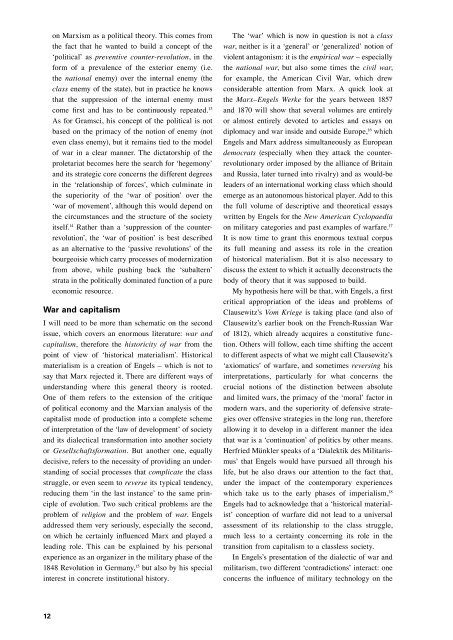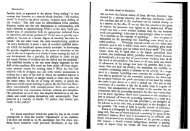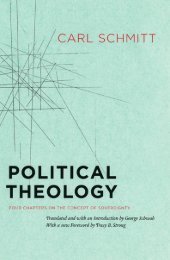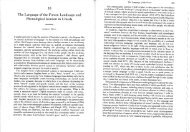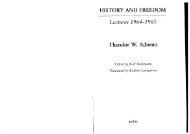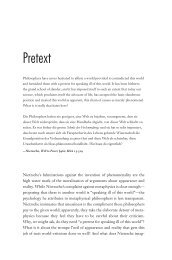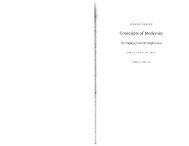Balibar Marxism and War.pdf - Townsend Humanities Lab
Balibar Marxism and War.pdf - Townsend Humanities Lab
Balibar Marxism and War.pdf - Townsend Humanities Lab
Create successful ePaper yourself
Turn your PDF publications into a flip-book with our unique Google optimized e-Paper software.
on <strong>Marxism</strong> as a political theory. This comes from<br />
the fact that he wanted to build a concept of the<br />
‘political’ as preventive counter-revolution, in the<br />
form of a prevalence of the exterior enemy (i.e.<br />
the national enemy) over the internal enemy (the<br />
class enemy of the state), but in practice he knows<br />
that the suppression of the internal enemy must<br />
come first <strong>and</strong> has to be continuously repeated. 13<br />
As for Gramsci, his concept of the political is not<br />
based on the primacy of the notion of enemy (not<br />
even class enemy), but it remains tied to the model<br />
of war in a clear manner. The dictatorship of the<br />
proletariat becomes here the search for ‘hegemony’<br />
<strong>and</strong> its strategic core concerns the different degrees<br />
in the ‘relationship of forces’, which culminate in<br />
the superiority of the ‘war of position’ over the<br />
‘war of movement’, although this would depend on<br />
the circumstances <strong>and</strong> the structure of the society<br />
itself. 14 Rather than a ‘suppression of the counterrevolution’,<br />
the ‘war of position’ is best described<br />
as an alternative to the ‘passive revolutions’ of the<br />
bourgeoisie which carry processes of modernization<br />
from above, while pushing back the ‘subaltern’<br />
strata in the politically dominated function of a pure<br />
economic resource.<br />
<strong>War</strong> <strong>and</strong> capitalism<br />
I will need to be more than schematic on the second<br />
issue, which covers an enormous literature: war <strong>and</strong><br />
capitalism, therefore the historicity of war from the<br />
point of view of ‘historical materialism’. Historical<br />
materialism is a creation of Engels – which is not to<br />
say that Marx rejected it. There are different ways of<br />
underst<strong>and</strong>ing where this general theory is rooted.<br />
One of them refers to the extension of the critique<br />
of political economy <strong>and</strong> the Marxian analysis of the<br />
capitalist mode of production into a complete scheme<br />
of interpretation of the ‘law of development’ of society<br />
<strong>and</strong> its dialectical transformation into another society<br />
or Gesellschaftsformation. But another one, equally<br />
decisive, refers to the necessity of providing an underst<strong>and</strong>ing<br />
of social processes that complicate the class<br />
struggle, or even seem to reverse its typical tendency,<br />
reducing them ‘in the last instance’ to the same principle<br />
of evolution. Two such critical problems are the<br />
problem of religion <strong>and</strong> the problem of war. Engels<br />
addressed them very seriously, especially the second,<br />
on which he certainly influenced Marx <strong>and</strong> played a<br />
leading role. This can be explained by his personal<br />
experience as an organizer in the military phase of the<br />
1848 Revolution in Germany, 15 but also by his special<br />
interest in concrete institutional history.<br />
The ‘war’ which is now in question is not a class<br />
war, neither is it a ‘general’ or ‘generalized’ notion of<br />
violent antagonism: it is the empirical war – especially<br />
the national war, but also some times the civil war,<br />
for example, the American Civil <strong>War</strong>, which drew<br />
considerable attention from Marx. A quick look at<br />
the Marx–Engels Werke for the years between 1857<br />
<strong>and</strong> 1870 will show that several volumes are entirely<br />
or almost entirely devoted to articles <strong>and</strong> essays on<br />
diplomacy <strong>and</strong> war inside <strong>and</strong> outside Europe, 16 which<br />
Engels <strong>and</strong> Marx address simultaneously as European<br />
democrats (especially when they attack the counterrevolutionary<br />
order imposed by the alliance of Britain<br />
<strong>and</strong> Russia, later turned into rivalry) <strong>and</strong> as would-be<br />
leaders of an international working class which should<br />
emerge as an autonomous historical player. Add to this<br />
the full volume of descriptive <strong>and</strong> theoretical essays<br />
written by Engels for the New American Cyclopaedia<br />
on military categories <strong>and</strong> past examples of warfare. 17<br />
It is now time to grant this enormous textual corpus<br />
its full meaning <strong>and</strong> assess its role in the creation<br />
of historical materialism. But it is also necessary to<br />
discuss the extent to which it actually deconstructs the<br />
body of theory that it was supposed to build.<br />
My hypothesis here will be that, with Engels, a first<br />
critical appropriation of the ideas <strong>and</strong> problems of<br />
Clausewitz’s Vom Kriege is taking place (<strong>and</strong> also of<br />
Clausewitz’s earlier book on the French-Russian <strong>War</strong><br />
of 1812), which already acquires a constitutive function.<br />
Others will follow, each time shifting the accent<br />
to different aspects of what we might call Clausewitz’s<br />
‘axiomatics’ of warfare, <strong>and</strong> sometimes reversing his<br />
interpretations, particularly for what concerns the<br />
crucial notions of the distinction between absolute<br />
<strong>and</strong> limited wars, the primacy of the ‘moral’ factor in<br />
modern wars, <strong>and</strong> the superiority of defensive strategies<br />
over offensive strategies in the long run, therefore<br />
allowing it to develop in a different manner the idea<br />
that war is a ‘continuation’ of politics by other means.<br />
Herfried Münkler speaks of a ‘Dialektik des Militarismus’<br />
that Engels would have pursued all through his<br />
life, but he also draws our attention to the fact that,<br />
under the impact of the contemporary experiences<br />
which take us to the early phases of imperialism, 18<br />
Engels had to acknowledge that a ‘historical materialist’<br />
conception of warfare did not lead to a universal<br />
assessment of its relationship to the class struggle,<br />
much less to a certainty concerning its role in the<br />
transition from capitalism to a classless society.<br />
In Engels’s presentation of the dialectic of war <strong>and</strong><br />
militarism, two different ‘contradictions’ interact: one<br />
concerns the influence of military technology on the<br />
12


